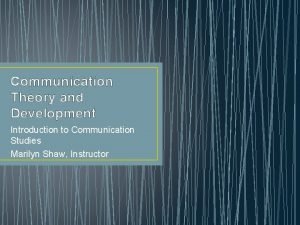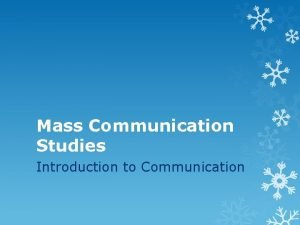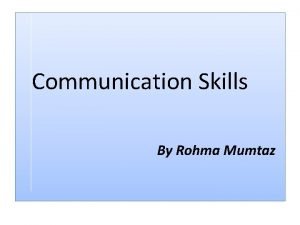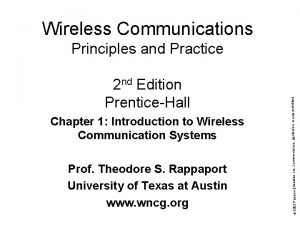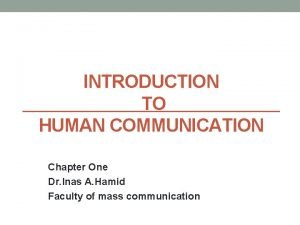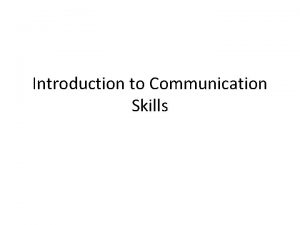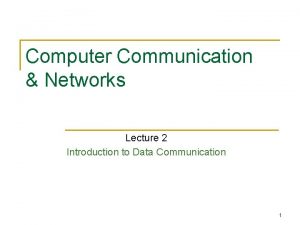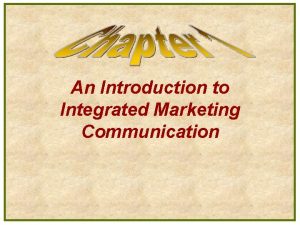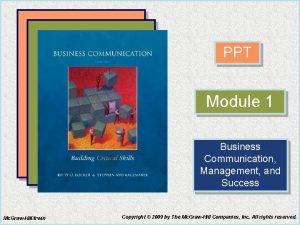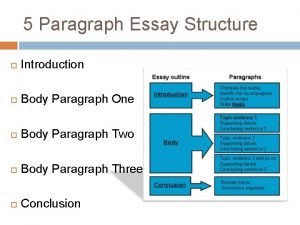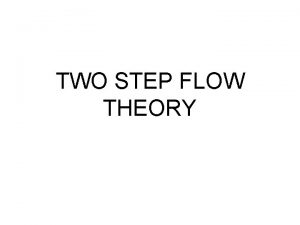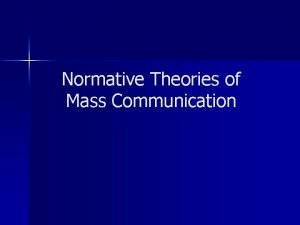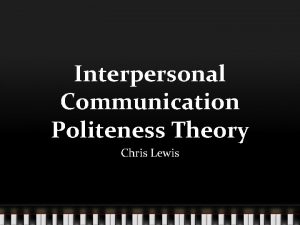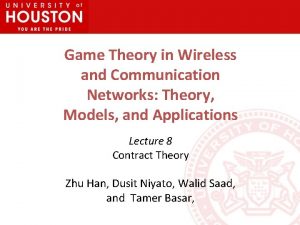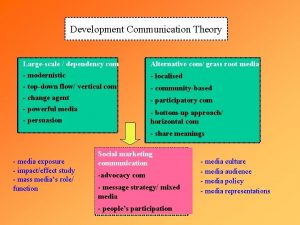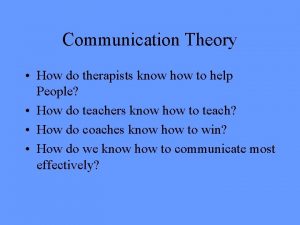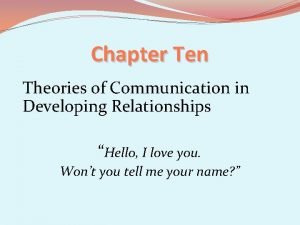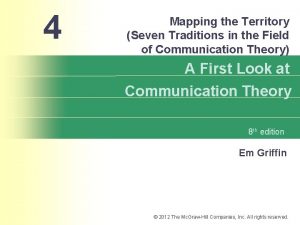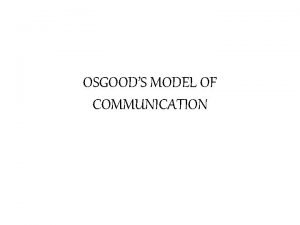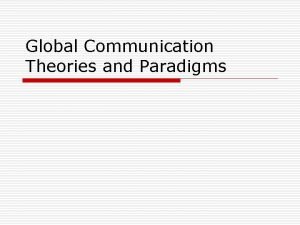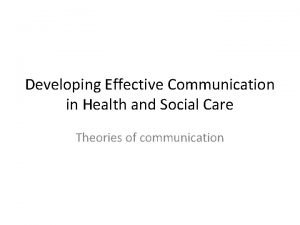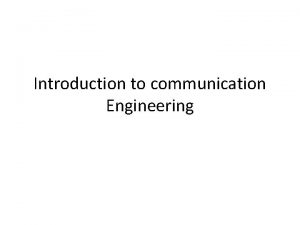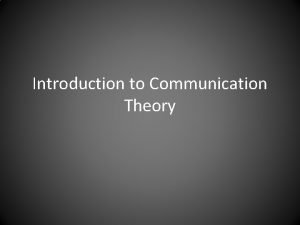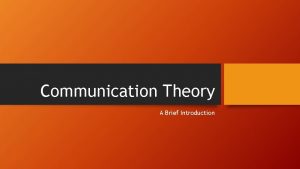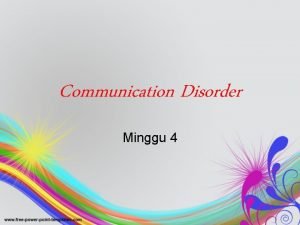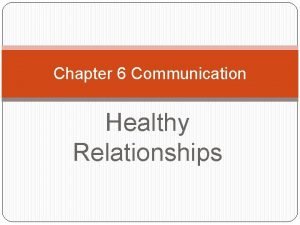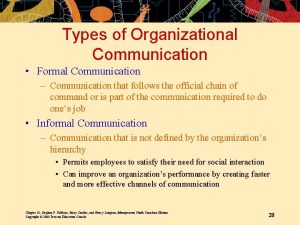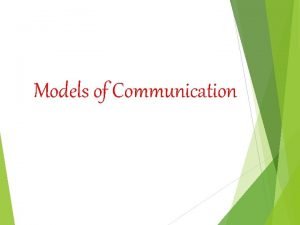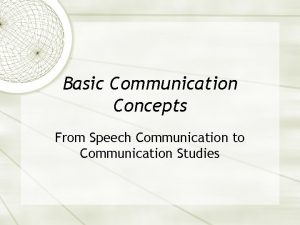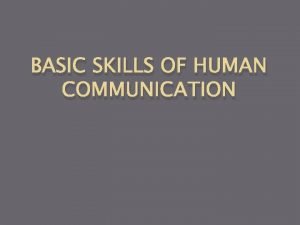Introduction to Communication Theory What is Theory What











































- Slides: 43

Introduction to Communication Theory

What is Theory?

What is Theory? Root of the word is related to the ancient Greek word for informed seeing.

What is Theory? Root of the word is related to the ancient Greek word for informed seeing. The original “theorists” were people paid by the city to travel to distant places, witness the rituals and customs of other cultures, and report back on their experiences.

What is Theory? We use the word today to refer to scientific or academic worldviews or models (e. g. , theory of evolution, or the wave theory of light).

What is Theory? In our class, we’ll argue that everyday people use implicit theories all the time to help attend to the world and coordinate action.

What is Theory? In our class, we’ll argue that everyday people use implicit theories all the time to help attend to the world and coordinate action. Theories, in this sense, are implicit cultural scripts …or “rituals”that enable action (but always contain limits and blind spots).

What is Theory? Theories are like lenses that allow you to focus on this, but not that.

What is Theory? Theories are like lenses that allow you to focus on this, but not that. As with the original meaning, they are ways of seeing.

CAT DOG TREE SQUIRREL


Three types of assumptions

Three types of assumptions • Ontological:

Three types of assumptions • Ontological: assumptions about the basic nature of the world

Three types of assumptions • Ontological: assumptions about the basic nature of the world – Are there innate differences between people of different races or genders? Are some people “naturally” violent? Are there some things we do because of “human nature”?

Three types of assumptions • Ontological: assumptions about the basic nature of the world – Are there innate differences between people of different races or genders? Are some people “naturally” violent? Are there some things we do because of “human nature”? – Ask: what are some of the basic assumptions about the “nature” of things/roles at play in my site.

Three types of assumptions • Epistemological:

Three types of assumptions • Epistemological: assumptions about knowledge

Three types of assumptions • Epistemological: assumptions about knowledge – How do we know and what counts as authoritative knowledge? Do we trust scientists, school teachers, priests, community leaders? Do we only trust our own experiences?

Three types of assumptions • Epistemological: assumptions about knowledge – How do we know and what counts as authoritative knowledge? Do we trust scientists, school teachers, priests, community leaders? Do we only trust our own experiences? – Ask: how do people in my site “know” what they think they know? What happens when different forms of knowing come into conflict?

Three types of assumptions • Axiological:

Three types of assumptions • Axiological: Assumptions about value, what is good and right; assumptions about the kind of world we want to pursue.

Three types of assumptions • Axiological: Assumptions about value, what is good and right; assumptions about the kind of world we want to pursue. – What counts as a good job, a good relationship, a good parenting approach, an appropriate style of dress or speech or conduct.

Three types of assumptions • Axiological: Assumptions about value, what is good and right; assumptions about the kind of world we want to pursue. – What counts as a good job, a good relationship, a good parenting approach, an appropriate style of dress or speech or conduct. – Ask: what are the ends, principles, or goals that drive action at my site…and what happens when they are not made explicit and not mutually shared?

Clash • Clashes in underlying (often implicit and unacknowledged) ontological, epistemological, and axiological assumptions drive conflict

Theory as a Way of Seeing

Theory as a Way of Seeing The meaningfulness of a thing is determined by our way of seeing, which is shaped by our specific project, and the underlying assumptions that drive it.

Theory as a Way of Seeing Theory helps us direct our attention to what matters in the situation and enables us to act.

Theory as a Way of Seeing Theory helps us direct our attention to what matters in the situation and enables us to act. Our theories, however, always contain blind spots and cover alternatives.

Theory as a Way of Seeing And participants in a culture often implicitly consent to use theories/rituals that are not in their best interests.

Theory as a Way of Seeing Key questions: What are the implicit assumptions/rituals/cultural scripts that drive a given interaction?

Theory as a Way of Seeing Key questions: What are the implicit assumptions/rituals/cultural scripts that drive a given interaction? Are they helping to solve the problem, or should they be revised?

Theory as a Way of Seeing Key questions: What are the implicit assumptions/rituals/cultural scripts that drive a given interaction? Are they helping to solve the problem, or should they be revised?

Theory as a Way of Seeing Our theories are not like mirrors that reflect the world as it is… they are more like lenses that allow us to focus on some things at the expense of others.

Theory as a Way of Seeing You probably believe the “theory” that the earth is curved, but you don’t operationalize that theory when you measure for a curtain rod.

Theory as a Way of Seeing So, as critical communication theorists, we ask: what underlying theories/assumptions are being operationalized to drive a given ritual or project?

Theory as a Way of Seeing So, as critical communication theorists, we ask: what underlying theories/assumptions are being operationalized to drive a given ritual or project (and are these the best choices)?

Consider the position of the researcher

Consider the position of the researcher You are an instrument for detecting cultural scripts--

Consider the position of the researcher You are an instrument for detecting cultural scripts-Note the norms, rules, and assumptions that underlying the rituals you observe.

Consider the position of the researcher You are an instrument for detecting cultural scripts-Note the norms, rules, and assumptions that underlying the rituals you observe. What are the taken-for-granted assumptions about how we “do business” around site?

Consider the position of the researcher Note: you can reveal those assumptions by partially violating them and then observing the response!

Consider the position of the researcher Note, too, however: You will bring your own assumptions and scripts to the scene and this can color your observations (productively or unproductively).
 Introduction to communication theory
Introduction to communication theory Parallel communication vs serial communication
Parallel communication vs serial communication What is oral communication and written communication
What is oral communication and written communication Serial communication vs parallel communication
Serial communication vs parallel communication Different types of mass communication
Different types of mass communication Difference between oral and written communication
Difference between oral and written communication Serial communication vs parallel communication
Serial communication vs parallel communication Wireless communication introduction
Wireless communication introduction Introduction of therapeutic communication
Introduction of therapeutic communication Small group communication
Small group communication Introduction to human communication
Introduction to human communication Introduction to corporate communication
Introduction to corporate communication Introduction of communication skills
Introduction of communication skills Business firm
Business firm Business communication introduction
Business communication introduction Introduction to data communication
Introduction to data communication Cloud storage models & communication apis
Cloud storage models & communication apis Laswell's model
Laswell's model Anything that prevents clear effective communication
Anything that prevents clear effective communication Introduction to information and communication technology
Introduction to information and communication technology Introduction to communication networks
Introduction to communication networks Internet etiqutte
Internet etiqutte Characteristics of formal communication
Characteristics of formal communication Introduction to integrated marketing communication
Introduction to integrated marketing communication Paiboc model of communication
Paiboc model of communication Introduction to information and communication technology
Introduction to information and communication technology Means in english
Means in english Business communication introduction
Business communication introduction Introduction communication
Introduction communication Introduction paragraph structure
Introduction paragraph structure Two step flow
Two step flow Normative theory in mass communication
Normative theory in mass communication Social constructivist meaning
Social constructivist meaning Preventative facework
Preventative facework Gibbs theory communication
Gibbs theory communication Game theory in wireless and communication networks
Game theory in wireless and communication networks Dependency theory in development communication
Dependency theory in development communication Communication theory
Communication theory Cl alt relationships
Cl alt relationships 7 traditions of communication theory
7 traditions of communication theory Osgood communication
Osgood communication Campaign communication theory
Campaign communication theory Dependency theory in international communication
Dependency theory in international communication One to one communication in health and social care
One to one communication in health and social care
